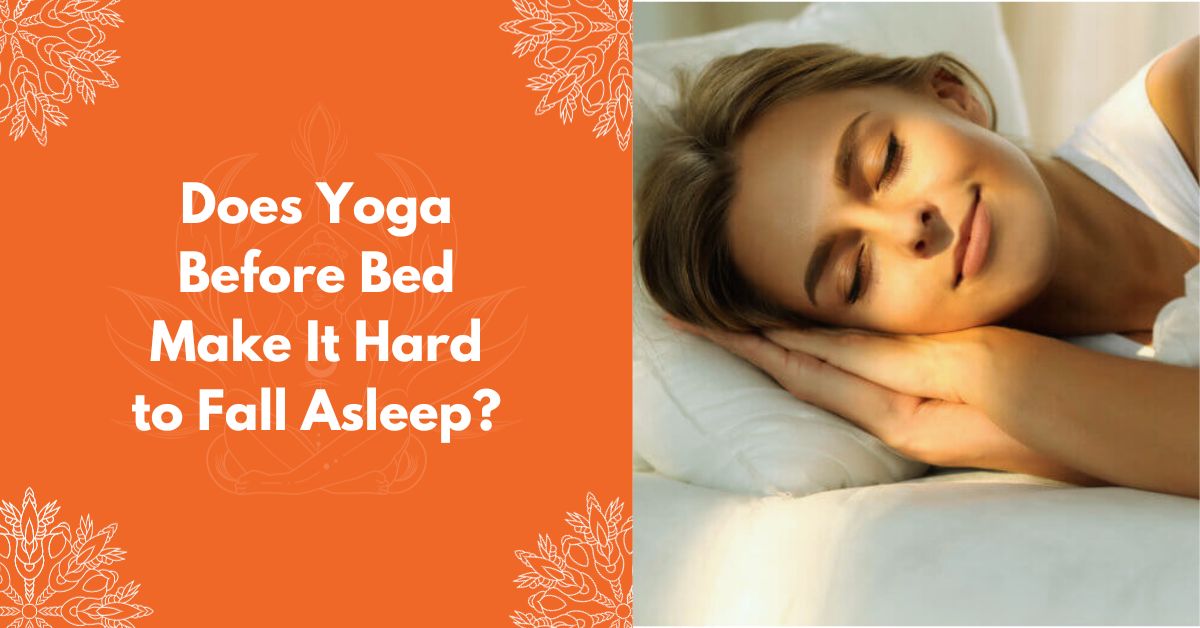
Does Yoga Before Bed Make It Hard to Fall Asleep?
Unlock the secret to peaceful nights with 🧘♂️ Yoga before bed! Discover if late-night yoga affects your sleep. Dive into deep relaxation and bid farewell to sleepless nights. 🌙✨
Does Yoga Before Bed Make It Hard to Fall Asleep? Debunking the Myths
In today’s fast-paced world, the quest for a good night’s sleep has become more elusive than ever. With numerous factors affecting our sleep patterns, it’s not surprising that people are turning to various methods, including yoga, to improve their sleep quality. One of the prevailing debates in the realm of sleep science is whether practicing yoga before bedtime aids or hampers falling asleep. In this article, we delve into this topic, providing you with evidence-based insights to help you separate fact from fiction.

Understanding the Connection Between Yoga and Sleep
Yoga, an ancient practice originating from India, combines physical postures, breathing exercises, and meditation techniques. Proponents claim it reduces stress, enhances flexibility, and promotes relaxation – all of which are beneficial for achieving restful sleep. However, the question remains: Does practicing yoga before bed disturb your sleep cycle?
The Science Behind Yoga and Sleep
Scientific studies have explored the relationship between yoga and sleep. A comprehensive review published in the Journal of Clinical Psychology reveals that yoga can indeed improve sleep quality. The study indicates that individuals who practiced yoga experienced increased sleep efficiency reduced wakefulness after sleep onset, and overall better sleep duration compared to those who did not engage in yoga practices.

How Does Yoga Affect Sleep
Yoga, a practice that combines physical postures, breathing exercises, and meditation techniques, has been studied extensively for its impact on sleep. Scientific research suggests that practicing yoga can significantly affect sleep in several ways:
Stress Reduction:
Yoga is renowned for its ability to reduce stress and promote relaxation. High stress levels often lead to sleep disturbances, and by practicing yoga, individuals can alleviate stress and create a calm mental state conducive to better sleep.
Muscle Relaxation:
Many yoga poses involve stretching and relaxing various muscle groups. This physical relaxation can help release tension in the body, making it easier to unwind and fall asleep.
Improving Sleep Quality:

Several studies have shown that regular yoga practice can improve overall sleep quality. This improvement is often attributed to the combination of physical activity, relaxation techniques, and mindfulness meditation commonly found in yoga sessions.
Regulating Breathing:
Yoga emphasizes conscious breathing techniques, such as deep breathing and diaphragmatic breathing. These practices can regulate breathing patterns, slow down the heart rate, and induce a state of relaxation, all of which are beneficial for falling asleep.
Mindfulness and Meditation:
Yoga often incorporates mindfulness meditation, which encourages being present in the moment and clearing the mind of distractions. This mindfulness practice can quiet the mind chatter that often keeps people awake, allowing for a more peaceful transition into sleep.
Hormonal Balance:

Yoga may influence the endocrine system, which plays a role in regulating sleep. Certain yoga practices can help balance hormones such as cortisol and melatonin, which are essential for establishing healthy sleep-wake cycles.
Insomnia Relief:
Individuals suffering from insomnia, a common sleep disorder, may find relief through yoga. Studies have shown that yoga can reduce the symptoms of insomnia, making it easier for individuals to fall asleep and stay asleep throughout the night.
Evening Yoga and Bedtime Routine:
Engaging in a gentle yoga routine specifically designed for the evening can signal to your body that it’s time to wind down. Yoga poses like Child’s Pose, Legs Up the Wall, and Corpse Pose, combined with breathing exercises, can prepare the body and mind for a restful night’s sleep.
Timing Matters: Yoga and Bedtime

One crucial aspect to consider is the timing of yoga practice concerning bedtime. Contrary to popular belief, engaging in a gentle, pre-sleep yoga routine can prepare your body for rest. Yoga poses like Child’s Pose, Legs Up the Wall, and Corpse Pose are specifically designed to relax your muscles and calm your mind, making it easier to transition into a peaceful slumber.
Mindfulness Meditation: A Sleep-Inducing Practice
Apart from physical postures, mindfulness meditation, often integrated into yoga sessions, plays a pivotal role in improving sleep quality. A study published in the Journal of Sleep Medicine & Disorders demonstrates that mindfulness meditation significantly reduces insomnia symptoms. By calming the mind and reducing anxiety, mindfulness meditation can pave the way for a serene night’s sleep.

Addressing the Concerns: Yoga and Sleep Disruptions
While the majority of evidence supports the idea that yoga enhances sleep, some individuals might experience sleep disturbances due to excessive physical exertion or practicing stimulating yoga styles close to bedtime. Vigorous yoga practices like Power Yoga or Hot Yoga can elevate your heart rate and body temperature, making it challenging to fall asleep immediately after the session.
Conclusion: Yoga as a Sleep-Inducing Ritual
In conclusion, the relationship between yoga and sleep is nuanced and depends on various factors, including the type of yoga practiced and the timing of the session. Engaging in a gentle yoga routine, incorporating relaxation techniques and mindfulness meditation, can significantly improve sleep quality. By understanding your body’s response to different yoga styles and choosing the appropriate practices, you can harness the power of yoga to promote restful sleep.
FAQs Related to Does Yoga Before Bed Make It Hard to Fall Asleep?
1. Does practicing yoga before bed always improve sleep quality?
Answer: Not necessarily. While gentle yoga and relaxation techniques usually enhance sleep, intense or stimulating yoga sessions close to bedtime might energize you, making it harder to fall asleep immediately after. It’s crucial to choose the right yoga style and intensity for the evening.
2. Can yoga help with specific sleep disorders like insomnia or sleep apnea?
Answer: Yes, yoga can be beneficial for individuals with sleep disorders. Mindfulness meditation and relaxation techniques in yoga can alleviate symptoms of insomnia. Although yoga alone might not be a complete solution for severe sleep apnea, it can complement other treatments and improve overall sleep quality.
3. How long should a yoga session be to see improvements in sleep patterns?
Answer: The duration of a yoga session can vary. However, consistency is key. Regular practice, even for as little as 15-20 minutes a day, can lead to noticeable improvements in sleep patterns over time. Establishing a daily yoga routine, especially in the evening, can enhance the quality of your sleep.
4. Are there specific yoga poses or techniques that work best for promoting sleep?
Answer: Yes, certain yoga poses and techniques are particularly effective for promoting sleep. Poses like Legs Up the Wall, Child’s Pose, and Supine Spinal Twist are excellent for relaxation. Incorporating deep breathing exercises, such as diaphragmatic breathing or alternate nostril breathing, can further enhance the sleep-inducing effects of yoga.
5. Can yoga help with stress-related sleep disturbances?
Answer: Absolutely. Yoga is renowned for its stress-reducing benefits. By practicing yoga regularly, individuals can manage stress levels effectively. Lower stress levels often translate to reduced sleep disturbances, making it easier to fall asleep and stay asleep throughout the night.

